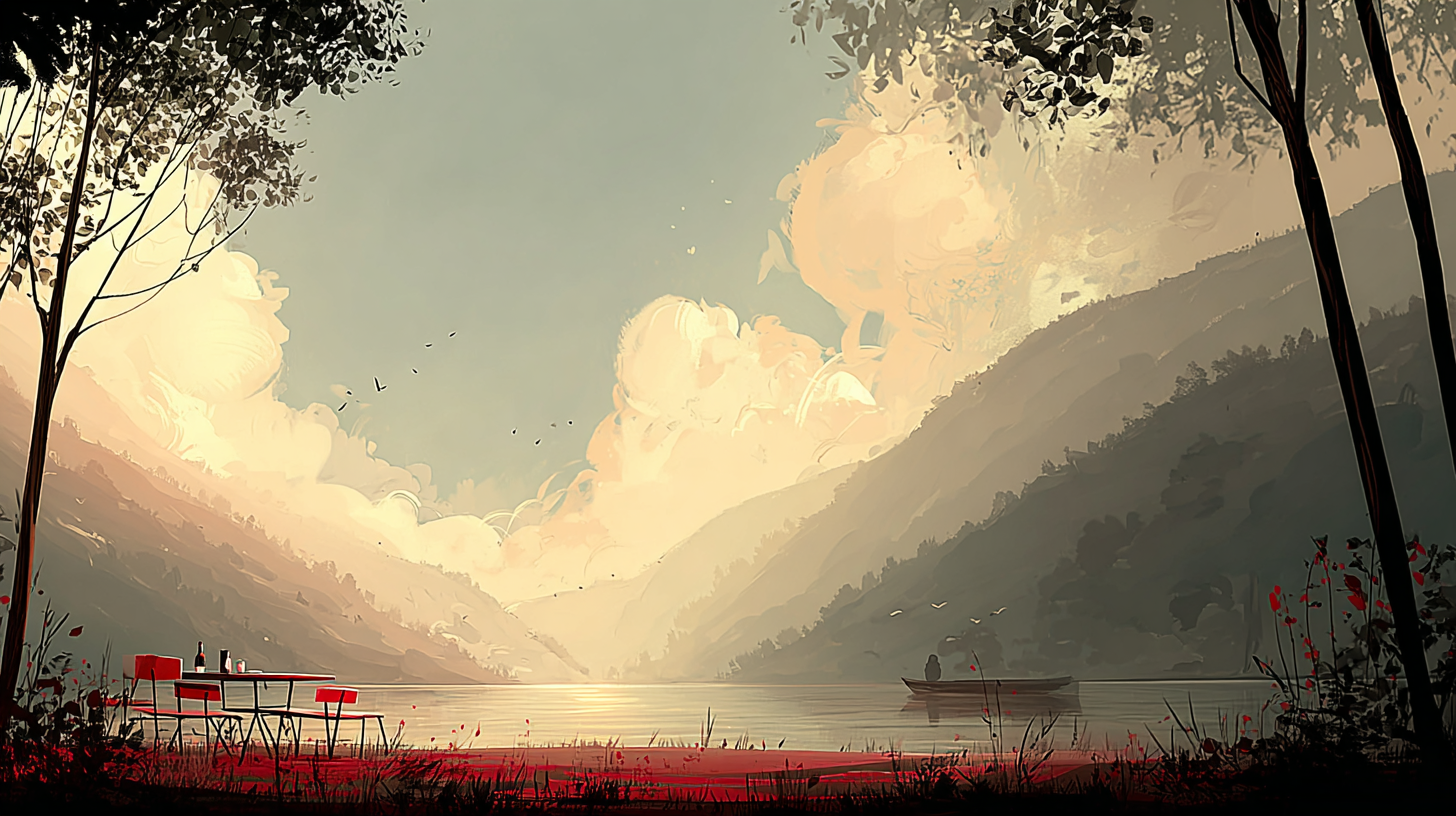A “lake” is a big place where water stays, like in mountains or forests.
「lake」は、山や森にある水がたまっている大きな場所のこと。
以下は英単語 “lake” に関するストーリー型学習コンテンツです。まずは大枠の意味を理解して最後の文章で確認しましょう。
主な意味(main meaning)
| 品詞 | 意味 | 発音記号 | 英語例文 |
|---|---|---|---|
| 名詞 | 湖、水がたまった大きな場所 | /leɪk/ | We had a picnic by the lake. |
語源(etymology)
「lake」はラテン語の lacus(池、水たまり)に由来します。この語源は「水がたまる場所」というイメージを持っています。
類義語(synonyms)
| 類義語 | 英語例文 |
|---|---|
| pond(池) | The ducks swam in the small pond. |
| reservoir(貯水池) | The reservoir supplies water to the whole city. |
| lagoon(潟湖) | The lagoon was calm and beautiful. |
| bay(湾) | The ship anchored in the quiet bay. |
| pool(水たまり・プール) | The children played in the pool. |
反義語(antonyms)
| 反義語 | 英語例文 |
|---|---|
| desert(砂漠) | Unlike a lake, a desert has no water. |
| mountain(山) | We climbed the mountain far from any lake. |
コロケーション(collocations)
| コロケーション | 英語例文 |
|---|---|
| deep lake | The diver explored the deep lake. |
| frozen lake | We skated on the frozen lake. |
| clear lake | We could see fish in the clear lake. |
| lake water | The lake water was cool and fresh. |
| lake shore | They walked along the lake shore. |
2項表現(binomials)
| 2項表現 | 英語例文 |
|---|---|
| lakes and rivers | Canada has many lakes and rivers. |
| hills and lakes | The area is full of hills and lakes. |
英語ストーリー(english story)
Title: A Day by the Lake
Emma had been working hard all week at her new office job. Her friend Mike suggested they take a break and go for a picnic by the lake. The lake was deep and clear, surrounded by tall trees and green hills. It reminded Emma of the lakes and rivers in her hometown.
As they arrived, they found a quiet spot near the lake shore. The lake water sparkled under the sun, and a few ducks swam in a small pond nearby. Mike brought sandwiches and drinks, and they sat on a blanket, enjoying the calm view.
Suddenly, they saw a group of children skating on a frozen lake not far away. “It’s still cold in the mornings,” Mike said. Emma smiled. “This is much better than being stuck in the office all day.”
They spent the afternoon talking, watching birds, and walking along the lake. Emma felt relaxed and happy. “Next weekend, let’s visit the reservoir near my cousin’s house,” she said.
Mike nodded. “Sure. I’ve always liked places with hills and lakes.”
和訳
タイトル:湖のほとりでの一日
エマは今週、新しいオフィスの仕事でずっと忙しかった。友人のマイクが、「少し休もうよ。湖にピクニックに行こう」と提案した。その湖(lake)は深く(deep)澄んで(clear)いて、高い木々と緑の丘に囲まれていた。それはエマに故郷の湖や川(lakes and rivers)を思い出させた。
彼らが到着すると、湖の岸辺(lake shore)の静かな場所を見つけた。湖の水(lake water)は太陽の下できらきらと輝き、近くの小さな池(pond)ではアヒルたちが泳いでいた。マイクはサンドイッチと飲み物を持ってきていて、二人はブランケットに座って静かな景色を楽しんだ。
突然、少し離れた場所で子どもたちが凍った湖(frozen lake)の上でスケートをしているのが見えた。「朝はまだ寒いね」とマイクが言った。エマはにっこり笑った。「一日中オフィスに閉じこもっているより、ずっといいわ。」
午後は、鳥を観察したり、話をしたり、湖のまわりを歩いたりして過ごした。エマはリラックスして幸せな気持ちだった。「来週末は、いとこの家の近くの貯水池(reservoir)に行こうよ」と言った。
マイクはうなずいた。「いいね。丘や湖(hills and lakes)がある場所って好きなんだ。」
Q&A
「lake」と「pond」の違いは?
「pond(池)」は「lake(湖)」よりも小さくて浅いです。一般的に人の手で作られることも多く、庭や公園などにある小さな水たまりのようなものが「pond」です。
「lake」と「reservoir」の違いは?
「reservoir(貯水池)」は、水をためる目的で人工的に作られた湖です。自然にできた「lake」とは異なり、都市の水道や農業用水を確保するために作られます。
「lake」と「lagoon」の違いは?
「lagoon(潟湖)」は、海の近くで砂やサンゴ礁によって海から隔てられた浅い水域です。一方、「lake」は内陸にあり、海とつながっていない淡水の水たまりです。
「lake」と「bay」の違いは?
「bay(湾)」は海の一部で、陸地に入り込んだ形の場所です。海水であることがポイントです。「lake」は海と関係なく、完全に陸地に囲まれた淡水の水域です。
「lake」と「pool」の違いは?
「pool(プール、水たまり)」は、小さな水のたまりで、人工的なもの(プール)や自然にできるもの(小さな水たまり)も含まれます。サイズ的には「lake」の方がはるかに大きいです。
「deep lake」とは何が特別なの?
「deep lake(深い湖)」は、底が見えないほど水深がある湖のことです。泳ぐ、潜る、ボートを使うといった活動に適しています。
「frozen lake」とは?
「frozen lake(凍った湖)」は、寒い気候で湖の表面が凍ってスケートなどができるようになった湖のことです。
「clear lake」とはどんな湖?
「clear lake(澄んだ湖)」は、水が透明で中が見えるほどきれいな湖のことです。環境がきれいな場所に多いです。
「lake shore」とは何?
「lake shore(湖の岸辺)」は、湖と陸地の境目のことを言います。散歩や釣りに適した場所です。
「lake water」と「tap water(蛇口の水)」の違いは?
「lake water(湖の水)」は自然の湖から得られる水で、飲む前には処理が必要なことが多いです。一方「tap water」は浄水処理された飲料水です。



コメント